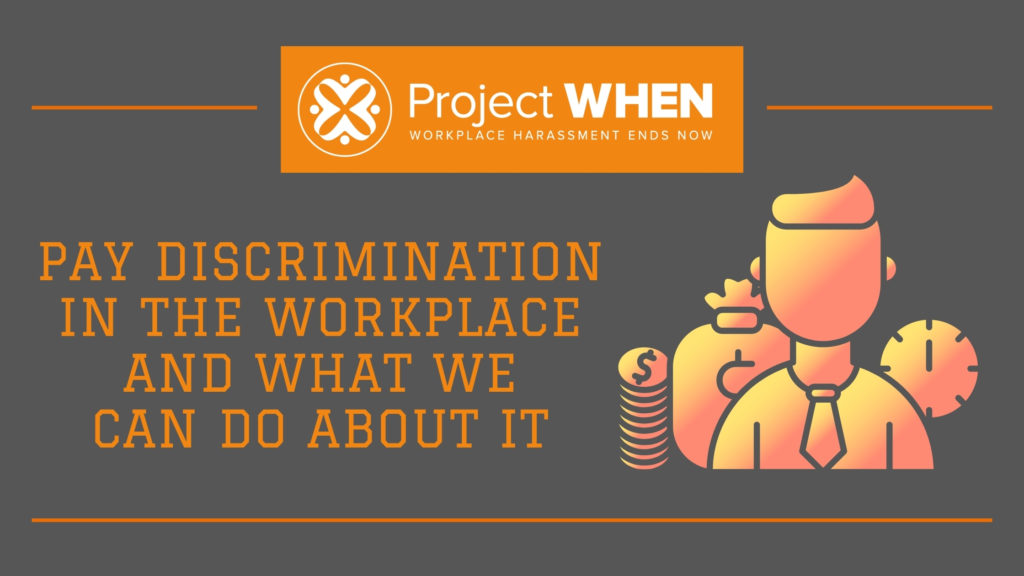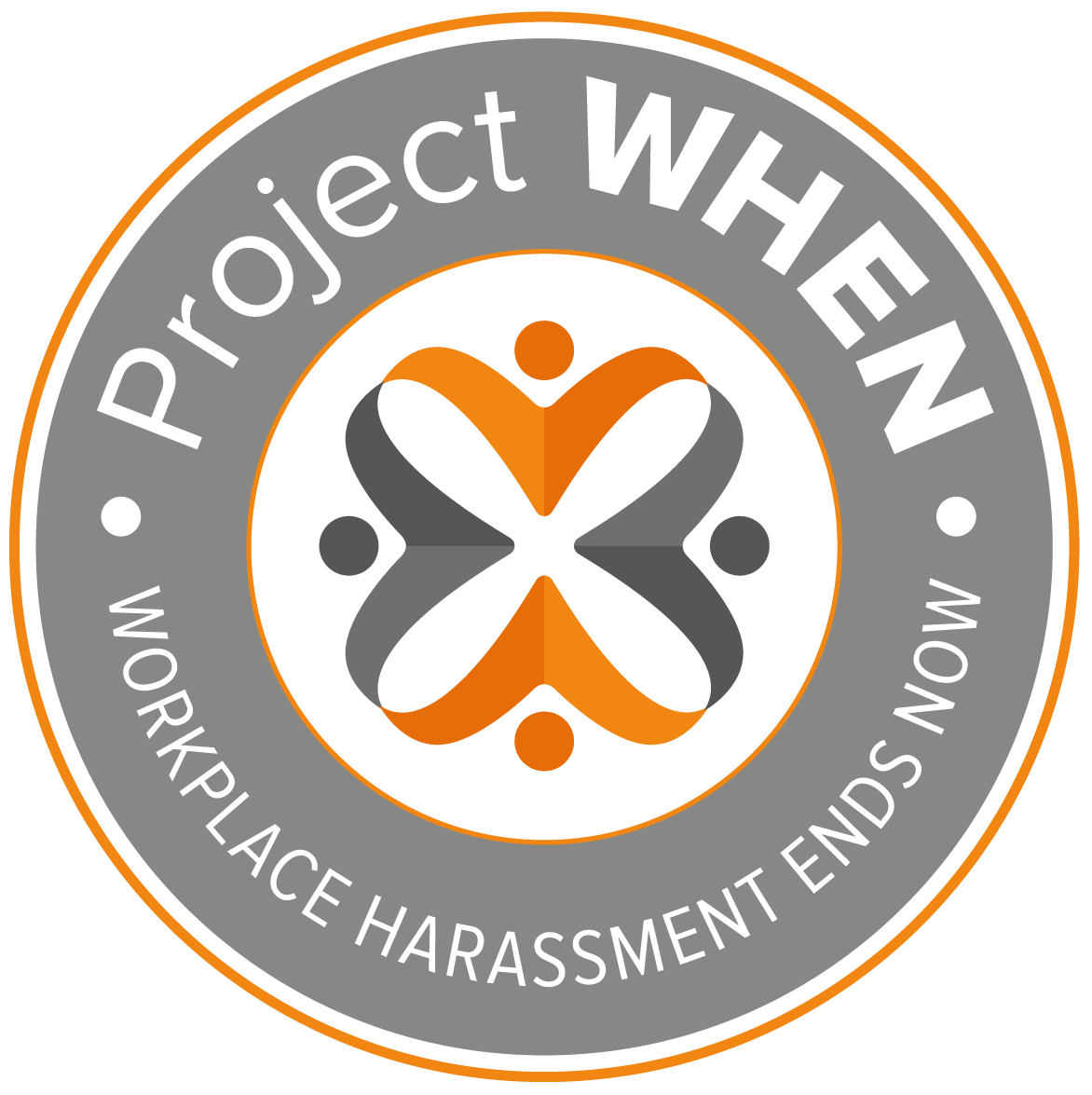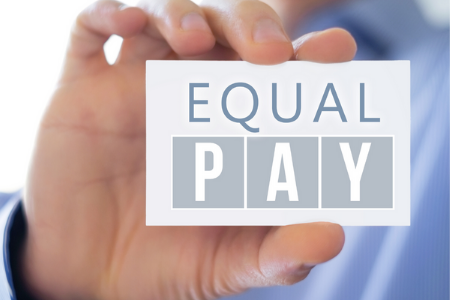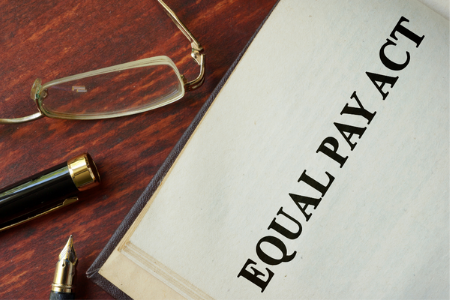Pay discrimination in the workplace: How companies can prevent it and what employees can do if it happens

Awareness against pay discrimination
 Do you feel that you are a victim of pay discrimination or have you observed it happening in your workplace? Let’s explore some facts that you should know in order to handle it.
Do you feel that you are a victim of pay discrimination or have you observed it happening in your workplace? Let’s explore some facts that you should know in order to handle it.
Our mission at Project WHEN (Workplace Harassment Ends Now) is to elevate awareness to eliminate harassment and create more respectful workplaces. This post on pay discrimination is part of our series of pages educating the public about various types of workplace harassment, how employers can prevent it, and employees’ rights under the law.
What is pay discrimination?
Pay or compensation discrimination happens when employees with substantially equal or similar work are paid disproportionately because of their age, race, color, sex/gender, disability, religion, and national origin. It must be noted that rather than job titles, job content determines what makes jobs equal.
In this post, we’ll touch on examples of compensation discrimination in the workplace, the laws offering protection from it, and the recourse victims of pay discrimination have under the law.
Importantly, we’ll also cover what employers can do to prevent compensation discrimination in the workplace, along with delving into what companies should do when an incident of pay discrimination takes place. You’ll also find a number of resources we feel are helpful for those dealing with this problem.
Examples of pay discrimination in the workplace
 Pay discrimination can manifest in various ways. Some experience wage disparity because of their gender. A recent EEOC lawsuit against a nursing home in Kansas City saw 12 female licensed practical nurses being paid less than their male co-workers performing the same job. The court ruled that the company violated the Equal Pay Act and Title VII of the Civil Rights Act and ordered them to pay $40,000 in monetary damages to the 12 female employees.
Pay discrimination can manifest in various ways. Some experience wage disparity because of their gender. A recent EEOC lawsuit against a nursing home in Kansas City saw 12 female licensed practical nurses being paid less than their male co-workers performing the same job. The court ruled that the company violated the Equal Pay Act and Title VII of the Civil Rights Act and ordered them to pay $40,000 in monetary damages to the 12 female employees.
Individuals may also face pay discrimination due to their race or national origin. In another lawsuit involving multiple violations of Equal Employment Opportunity (EEO) laws, Jackson National Life Insurance paid $20.5 million in settlements to their 21 former employees. Among other violations such as sex discrimination and retaliation, Jackson discriminated against African American and female employees by paying them less than their white employees.
These are just some of the real cases that reflect the multifaceted reality of wage discrimination that many workers are facing today.
Statistics on pay discrimination
According to statistics recorded by the Equal Employment Opportunity Commission (EEOC), charges filed and resolved under the Equal Pay Act in fiscal year 2019 reached 1,117 which is the highest figure recorded within the last ten years.
In terms of monetary benefits received by victims, the cost went up to $20.7M in FY 2019, which is double the cost of $10.5M recorded in FY 2018.
In this day and age, wage discrimination is still a reality for some participants of the labor force, and no one deserves to be paid less for no valid reason (such as experience or performance). Read on to explore what laws protect you from it, as well as key actions to take by both companies and victims in dealing with this type of discrimination.
Pay discrimination laws
Federal Laws
Several laws enforced by the EEOC make it unlawful for employers to discriminate against an individual in the aspect of compensation.
Equal Pay Act
 The Equal Pay Act of 1963 (EPA), an amendment to Fair Labor Standards Act, was passed to ensure that male and female employees performing substantially similar work are paid equally. Under this law, virtually all employers and all types of compensation paid to an employee are covered. This includes salary, overtime pay, bonuses, vacation/holiday pay, gas/cleaning allowances, insurance, travel expense reimbursement, and benefits.
The Equal Pay Act of 1963 (EPA), an amendment to Fair Labor Standards Act, was passed to ensure that male and female employees performing substantially similar work are paid equally. Under this law, virtually all employers and all types of compensation paid to an employee are covered. This includes salary, overtime pay, bonuses, vacation/holiday pay, gas/cleaning allowances, insurance, travel expense reimbursement, and benefits.
In order to determine the validity of a pay discrimination claim under the Equal Pay Act, courts look into several objective factors. As mentioned above, the jobs being subjected to comparison must be substantially similar. This means that both must require the same degree of effort, responsibility, and skill (ability, education, training, experience).
Additionally, employees involved in the case must be working in the same establishment or in one physical business location. Specific working conditions such as temperature, hazards, ventilation, among others, are also put into consideration when determining whether the jobs in question are equal.
Furthermore, the disparity between employees’ compensation does not have to be willful. As long as all other criteria under the law are met, it can be proven that a violation has occurred. In this case, it is the employer’s responsibility to prove that the disparity is caused by non-discriminatory reasons. If there is indeed an inequality, an employer may not reduce the pay made to an employee with higher compensation; the victim’s pay must be increased to correct the disparity.
Below is an excerpt from the Equal Pay Act of 1963 as it appears in volume 29 of the United States Code.
| Equal Pay Act of 1963
MINIMUM WAGE SEC. 206. [Section 6] (d) Prohibition of sex discrimination (1) No employer having employees subject to any provisions of this section shall discriminate, within any establishment in which such employees are employed, between employees on the basis of sex by paying wages to employees in such establishment at a rate less than the rate at which he pays wages to employees of the opposite sex in such establishment for equal work on jobs the performance of which requires equal skill, effort, and responsibility, and which are performed under similar working conditions, except where such payment is made pursuant to (i) a seniority system; (ii) a merit system; (iii) a system which measures earnings by quantity or quality of production; or (iv) a differential based on any other factor other than sex: Provided, That an employer who is paying a wage rate differential in violation of this subsection shall not, in order to comply with the provisions of this subsection, reduce the wage rate of any employee. (2) No labor organization, or its agents, representing employees of an employer having employees subject to any provisions of this section shall cause or attempt to cause such an employer to discriminate against an employee in violation of paragraph (1) of this subsection. (3) For purposes of administration and enforcement, any amounts owing to any employee which have been withheld in violation of this subsection shall be deemed to be unpaid minimum wages or unpaid overtime compensation under this chapter. (4) As used in this subsection, the term “labor organization” means any organization of any kind, or any agency or employee representation committee or plan, in which employees participate and which exists for the purpose, in whole or in part, of dealing with employers concerning grievances, labor disputes, wages, rates of pay, hours of employment, or conditions of work. |
Title VII, ADEA, ADA
Title VII of the Civil Rights Act, Age Discrimination in Employment Act (ADEA), and Americans with Disabilities Act (ADA) are other federal laws that prohibit compensation discrimination due to race, color, religion, sex/gender, national origin, age, or disability.
These laws are different from the Equal Pay Act in a way that these statutes do not require the employees’ jobs to be similar, nor are the employees required to be working in one establishment. This means that they can be located in different branches or work locations of the company/business.
Under these laws, the victim, who is a member of the protected class, must show evidence that the employer is giving him/her less favorable treatment compared to others. For instance, an employer cannot pay a person with disability less than employees without disabilities, especially if it is not caused by a valid reason.
Who is covered by these laws? Under Title VII and ADA, the requirements apply to employers with 15 or more employees, while employers with 20 or more employees are covered by the ADEA.
State Laws
Aside from federal laws, most states enforce laws that protect workers from pay discrimination. The best way to learn more about additional protections you can receive locally is to refer to your state’s department of labor website. Our guide on reporting incidents of workplace harassment links to each state’s DOL website, as well as some of the regional and city organizations, for those in more populous areas.
Recourse for victims of pay discrimination
If you think you or a colleague is suffering pay discrimination, you have the right to seek legal recourse. Essentially, you have two options if you think that a violation of the Equal Pay Act has occurred: to go directly to court or file a discrimination charge with the EEOC. If you plan on escalating the case directly to court, you are not required to file an EEOC charge beforehand. Victims have two years to head to court or to the EEOC once a violation of the EPA occurs.
For cases that fall under Title VII, ADA, and ADEA, individuals have 180 days to file an EEOC charge. It is recommended to check if your state’s laws provide an extension to this time limit.
Importantly, you are not required to speak with an attorney before approaching a government agency to discuss your situation; these entities are in place to protect your rights as an employee and are typically willing to give guidance on suggested next steps for you as a victim.
To know about the process of reporting compensation discrimination cases, refer to our full guide on How to Report Workplace Harassment Incidents. This article provides a comprehensive list of state resources and local U.S. Equal Employment Opportunity Commission offices. You can also head directly to the EEOC’s page on How to File a Charge of Employment Discrimination.
What can companies do to prevent pay discrimination?
The primary action that companies should actively take in order to prevent compensation discrimination is to be knowledgeable of the requirements set forth by federal and state laws.
It would be helpful to know what you need to do and what you need to avoid when it comes to hiring and pay practices. For example, states like California, Massachusetts, and Hawaii have laws that prohibit employers from asking applicants about their salary history.
The advocacy to prevent this type of discrimination must start with senior leadership, but sometimes change takes one individual who has the courage to speak up. If you are passionate about ensuring the safety of employees from the different manifestations of discrimination, consider getting your company involved with Project WHEN (Workplace Harassment Ends Now).
As a first step, we’d ask you to sign our Pledge of Commitment to demonstrate your commitment to creating a respectful, harassment-free workplace for your employees.
For a holistic and structured approach to living out your commitment, we would encourage you to enroll in the WHEN™ Organizational Certification program. In this program, we will guide you through a step-by-step process of preventing all types of workplace harassment. This certification will also serve as a powerful statement to both internal and external audiences about your commitment to making your workplace a safe space for everyone. The Employee Culture Pulse Survey, which is also offered as a standalone service, will be administered to employees in the first phase of this program. The actionable data gained from this survey will allow you to identify challenges in your fight against workplace harassment and strategize your path to improvement.
What should companies do when pay discrimination happens?
Acts of discrimination happen when companies lack awareness and implementation of preventive measures. When tell-tale signs of hostility are observed within the organization, it is time to start dismantling it by engaging in meaningful conversations and breaking the status quo.
 If you are ready to begin discussions on creating a more respectful work environment, we can facilitate a Project WHEN Roundtable. This event can help attendees identify challenges present in their current working conditions and gain insight on the best action steps to eliminate traces of discrimination in the workplace.
If you are ready to begin discussions on creating a more respectful work environment, we can facilitate a Project WHEN Roundtable. This event can help attendees identify challenges present in their current working conditions and gain insight on the best action steps to eliminate traces of discrimination in the workplace.
If you are an individual who thinks that it is time to see change happening in your company, let your employer know about this and ask for a facilitated discussion to take place. Remember, the problem will not solve itself. It is important for everyone to develop heightened awareness of what they can do to make a difference. Change will only take place if people within the workplace take the initiative to address issues, no matter how uncomfortable it may be.
Additional resources and recommended readings
For more information about compensation discrimination, we’ve rounded up some resources that you can consult and find below.
- Equal Pay/Compensation Discrimination | EEOC
- Pay Discrimination – FAQs
- Section 10 Compensation Discrimination | EEOC guidance document
- The Equal Pay Act of 1963
End pay discrimination now
Nobody should have to face pay discrimination or any form of harassment, for that matter. Project WHEN is a 501(c)(3) nonprofit organization working hard to make workplaces more respectful for everyone. Elevating awareness to prevent workplace harassment from taking place is what runs at the core of our organization.
Whether you’d like to make a financial contribution to support our work, sign the Project WHEN Pledge of Commitment, have your employer host a Project WHEN event, or just join our mailing list to learn of volunteer opportunities, everyone can get involved with Project WHEN!
Examples of Pay Discrimination in Various Industries
Pay Discrimination is a prevalent issue that happens in different workplace settings. Here are some examples of the pay discrimination issues the workplace is currently facing:
Pay Discrimination at Aims Community College – 1/24/2022
The Greeley-based Aims Community College has been named in three lawsuits alleging gender discrimination or sexual harassment. Patricia Rand, former associate vice president of academic affairs, filed a lawsuit in Weld County District Court. She claimed that she was forced to resign after 16 years at the college due to “constant gender discrimination and a hostile work environment.” A lawsuit similar to Rand’s was filed by Sarah Wyscaver, vice president of student engagement, inclusion, and success. She claimed gender discrimination and lower pay than men doing comparable work. Aims vehemently denies Wyscaver and Rand’s allegations.
Pay Discrimination at King Studio LLC – 12/14/2021
YouTuber and TikTok star Zach King is being sued by a former producer who is accusing him of sexual harassment, wrongful termination, pay discrimination gender discrimination, among several other counts, according to a civil complaint filed by Elisabeth Logan in Los Angeles County’s Court. Logan claims that King created “an abusive work atmosphere” by stripping naked in her office and paying her less than male colleagues. A court summons states that King, his company, and even TikTok have 30 days to respond to accusations made by Logan. However, King has not publicly addressed the lawsuit.
Pay Discrimination at Kern Community College – 11/3/2021
Kern Community College District’s former public safety director is suing for alleged harassment, discrimination, and retaliation after employees falsely accused him of having workplace romances. Christopher Counts’ lawsuit also claimed that the district set him up for failure by refusing to fill assistant positions despite funding, cutting his pay, and reprimanding him without cause. The district declined to comment on matters involving ongoing litigation.
Underpaid Employees at Google – 09/15/2021
More than 140 Google employees and subcontracted workers have signed a petition addressed to Google executives, demanding that the company pay back wages to temporary workers. The petition, organized by the Alphabet Workers Union (AWU), started after a report revealed that Google had knowingly and illegally underpaid thousands of temps for years.
Underpayment at Blue Moon Cafe – 7/30/2021
On July 17, half of the staff at Blue Moon Cafe walked out as a result of a toxic work environment, underpayment issues, and sexual harassment. The standoff caused the cafe to abruptly shut down before its opening time. Weeks after its shutdown, the cafe reopened and will be “turning over a new leaf.”
Compensation Discrimination at Activision Blizzard – 7/22/2021
California sues Activision Blizzard following a two-year investigation that found out female employees of the video game company have been discriminated against in terms of compensation, promotion, and termination, while constantly being subjected to rape jokes, inappropriate behavior from male employees, and retaliation, among other different forms of harassment.
Subminimum Wage at Olive Garden – 7/20/2021
Hannah Shaber, the lead organizer in New York for One Fair Wage, has filed a lawsuit against the parent company of Olive Garden alleging that the company’s subminimum wage policy is a violation of the Civil Rights Act. Shaber further shares that the tipping system is the manifestation of subminimum wage and promotes sexual harassment and racial inequity.
Wage Theft at Polonia – 7/15/2021
Polonia, an iconic Polish restaurant in Hamtramck, is facing a lawsuit filed by two waitresses alleging harassment and wage theft by the Polonia manager. The waitresses claimed that the manager groped, stalked, made sexually inappropriate remarks to them and several other women, and denied them of their earned tips.
Pay Discrimination at In-N-Out Burger – 6/11/2021
In-N-Out Burger is facing a lawsuit alleging that it shorted workers on pay, failed to address incidents of sexual harassment and retaliated against employees when they complained of inadequate COVID-19 protections. The lawsuit was filed by a former In-N-Out employee on behalf of himself and other victims.
Pay Discrimination at Microsoft – 5/19/2021
Internal Microsoft complaints reveal how women who worked there were “ignored, harassed, and degraded.” According to the class-action complaint filed by previous employees, the company discriminated against women in terms of compensation and promotions. In response, Satya Nadella, the CEO of Microsoft, said that the business will reform its process for dealing with employee complaints of harassment and discrimination in the workplace.
Pay Discrimination & Toxic Work Environment at Platform Beer Co.’s taproom in Columbus – 2/28/2021
In February of 2021, this brewery based in Cleveland saw the entire Columbus crew quit their jobs due to pay discrimination and other management issues. Employees took to social media to share the letter addressed to the co-founder of Platform expressing their condemnation against this discriminatory act. The company temporarily closed down after this.

